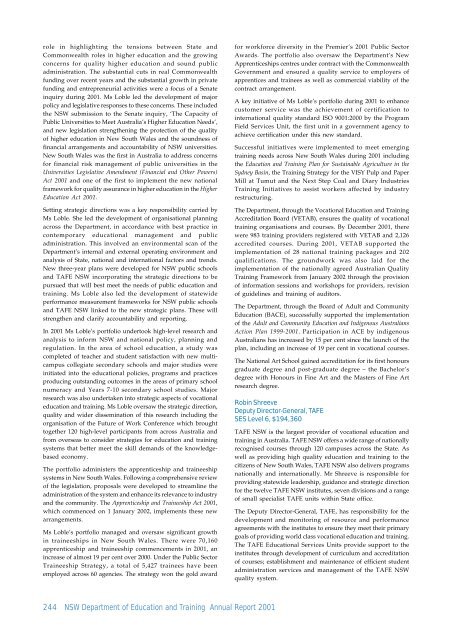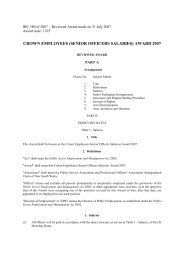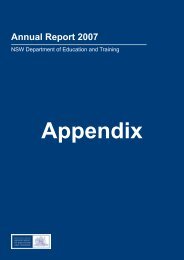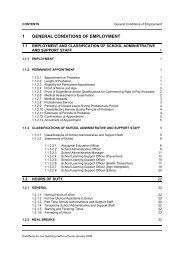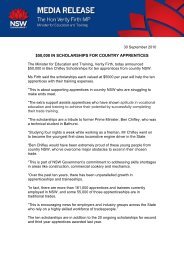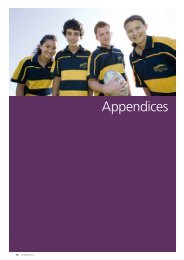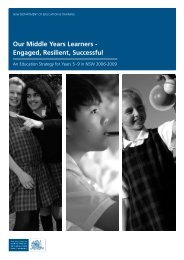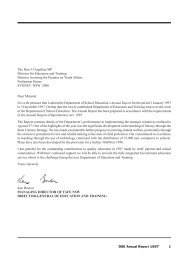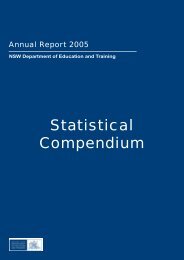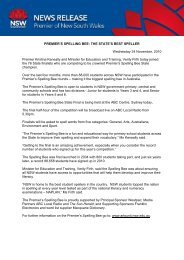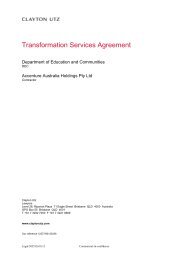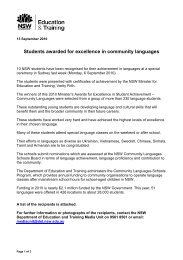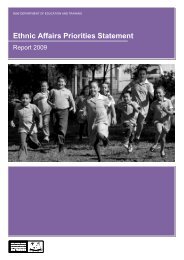APPENDICES - Department of Education and Communities - NSW ...
APPENDICES - Department of Education and Communities - NSW ...
APPENDICES - Department of Education and Communities - NSW ...
You also want an ePaper? Increase the reach of your titles
YUMPU automatically turns print PDFs into web optimized ePapers that Google loves.
ole in highlighting the tensions between State <strong>and</strong>Commonwealth roles in higher education <strong>and</strong> the growingconcerns for quality higher education <strong>and</strong> sound publicadministration. The substantial cuts in real Commonwealthfunding over recent years <strong>and</strong> the substantial growth in privatefunding <strong>and</strong> entrepreneurial activities were a focus <strong>of</strong> a Senateinquiry during 2001. Ms Loble led the development <strong>of</strong> majorpolicy <strong>and</strong> legislative responses to these concerns. These includedthe <strong>NSW</strong> submission to the Senate inquiry, ‘The Capacity <strong>of</strong>Public Universities to Meet Australia’s Higher <strong>Education</strong> Needs’,<strong>and</strong> new legislation strengthening the protection <strong>of</strong> the quality<strong>of</strong> higher education in New South Wales <strong>and</strong> the soundness <strong>of</strong>financial arrangements <strong>and</strong> accountability <strong>of</strong> <strong>NSW</strong> universities.New South Wales was the first in Australia to address concernsfor financial risk management <strong>of</strong> public universities in theUniversities Legislative Amendment (Financial <strong>and</strong> Other Powers)Act 2001 <strong>and</strong> one <strong>of</strong> the first to implement the new nationalframework for quality assurance in higher education in the Higher<strong>Education</strong> Act 2001.Setting strategic directions was a key responsibility carried byMs Loble. She led the development <strong>of</strong> organisational planningacross the <strong>Department</strong>, in accordance with best practice incontemporary educational management <strong>and</strong> publicadministration. This involved an environmental scan <strong>of</strong> the<strong>Department</strong>’s internal <strong>and</strong> external operating environment <strong>and</strong>analysis <strong>of</strong> State, national <strong>and</strong> international factors <strong>and</strong> trends.New three-year plans were developed for <strong>NSW</strong> public schools<strong>and</strong> TAFE <strong>NSW</strong> incorporating the strategic directions to bepursued that will best meet the needs <strong>of</strong> public education <strong>and</strong>training. Ms Loble also led the development <strong>of</strong> statewideperformance measurement frameworks for <strong>NSW</strong> public schools<strong>and</strong> TAFE <strong>NSW</strong> linked to the new strategic plans. These willstrengthen <strong>and</strong> clarify accountability <strong>and</strong> reporting.In 2001 Ms Loble’s portfolio undertook high-level research <strong>and</strong>analysis to inform <strong>NSW</strong> <strong>and</strong> national policy, planning <strong>and</strong>regulation. In the area <strong>of</strong> school education, a study wascompleted <strong>of</strong> teacher <strong>and</strong> student satisfaction with new multicampuscollegiate secondary schools <strong>and</strong> major studies wereinitiated into the educational policies, programs <strong>and</strong> practicesproducing outst<strong>and</strong>ing outcomes in the areas <strong>of</strong> primary schoolnumeracy <strong>and</strong> Years 7-10 secondary school studies. Majorresearch was also undertaken into strategic aspects <strong>of</strong> vocationaleducation <strong>and</strong> training. Ms Loble oversaw the strategic direction,quality <strong>and</strong> wider dissemination <strong>of</strong> this research including theorganisation <strong>of</strong> the Future <strong>of</strong> Work Conference which broughttogether 120 high-level participants from across Australia <strong>and</strong>from overseas to consider strategies for education <strong>and</strong> trainingsystems that better meet the skill dem<strong>and</strong>s <strong>of</strong> the knowledgebasedeconomy.The portfolio administers the apprenticeship <strong>and</strong> traineeshipsystems in New South Wales. Following a comprehensive review<strong>of</strong> the legislation, proposals were developed to streamline theadministration <strong>of</strong> the system <strong>and</strong> enhance its relevance to industry<strong>and</strong> the community. The Apprenticeship <strong>and</strong> Traineeship Act 2001,which commenced on 1 January 2002, implements these newarrangements.Ms Loble’s portfolio managed <strong>and</strong> oversaw significant growthin traineeships in New South Wales. There were 70,160apprenticeship <strong>and</strong> traineeship commencements in 2001, anincrease <strong>of</strong> almost 19 per cent over 2000. Under the Public SectorTraineeship Strategy, a total <strong>of</strong> 5,427 trainees have beenemployed across 60 agencies. The strategy won the gold awardfor workforce diversity in the Premier’s 2001 Public SectorAwards. The portfolio also oversaw the <strong>Department</strong>’s NewApprenticeships centres under contract with the CommonwealthGovernment <strong>and</strong> ensured a quality service to employers <strong>of</strong>apprentices <strong>and</strong> trainees as well as commercial viability <strong>of</strong> thecontract arrangement.A key initiative <strong>of</strong> Ms Loble’s portfolio during 2001 to enhancecustomer service was the achievement <strong>of</strong> certification tointernational quality st<strong>and</strong>ard ISO 9001:2000 by the ProgramField Services Unit, the first unit in a government agency toachieve certification under this new st<strong>and</strong>ard.Successful initiatives were implemented to meet emergingtraining needs across New South Wales during 2001 includingthe <strong>Education</strong> <strong>and</strong> Training Plan for Sustainable Agriculture in theSydney Basin, the Training Strategy for the VISY Pulp <strong>and</strong> PaperMill at Tumut <strong>and</strong> the Next Step Coal <strong>and</strong> Diary IndustriesTraining Initiatives to assist workers affected by industryrestructuring.The <strong>Department</strong>, through the Vocational <strong>Education</strong> <strong>and</strong> TrainingAccreditation Board (VETAB), ensures the quality <strong>of</strong> vocationaltraining organisations <strong>and</strong> courses. By December 2001, therewere 983 training providers registered with VETAB <strong>and</strong> 2,126accredited courses. During 2001, VETAB supported theimplementation <strong>of</strong> 28 national training packages <strong>and</strong> 202qualifications. The groundwork was also laid for theimplementation <strong>of</strong> the nationally agreed Australian QualityTraining Framework from January 2002 through the provision<strong>of</strong> information sessions <strong>and</strong> workshops for providers, revision<strong>of</strong> guidelines <strong>and</strong> training <strong>of</strong> auditors.The <strong>Department</strong>, through the Board <strong>of</strong> Adult <strong>and</strong> Community<strong>Education</strong> (BACE), successfully supported the implementation<strong>of</strong> the Adult <strong>and</strong> Community <strong>Education</strong> <strong>and</strong> Indigenous AustraliansAction Plan 1999-2001. Participation in ACE by indigenousAustralians has increased by 15 per cent since the launch <strong>of</strong> theplan, including an increase <strong>of</strong> 19 per cent in vocational courses.The National Art School gained accreditation for its first honoursgraduate degree <strong>and</strong> post-graduate degree – the Bachelor’sdegree with Honours in Fine Art <strong>and</strong> the Masters <strong>of</strong> Fine Artresearch degree.Robin ShreeveDeputy Director-General, TAFESES Level 6, $194,360TAFE <strong>NSW</strong> is the largest provider <strong>of</strong> vocational education <strong>and</strong>training in Australia. TAFE <strong>NSW</strong> <strong>of</strong>fers a wide range <strong>of</strong> nationallyrecognised courses through 120 campuses across the State. Aswell as providing high quality education <strong>and</strong> training to thecitizens <strong>of</strong> New South Wales, TAFE <strong>NSW</strong> also delivers programsnationally <strong>and</strong> internationally. Mr Shreeve is responsible forproviding statewide leadership, guidance <strong>and</strong> strategic directionfor the twelve TAFE <strong>NSW</strong> institutes, seven divisions <strong>and</strong> a range<strong>of</strong> small specialist TAFE units within State <strong>of</strong>fice.The Deputy Director-General, TAFE, has responsibility for thedevelopment <strong>and</strong> monitoring <strong>of</strong> resource <strong>and</strong> performanceagreements with the institutes to ensure they meet their primarygoals <strong>of</strong> providing world class vocational education <strong>and</strong> training.The TAFE <strong>Education</strong>al Services Units provide support to theinstitutes through development <strong>of</strong> curriculum <strong>and</strong> accreditation<strong>of</strong> courses; establishment <strong>and</strong> maintenance <strong>of</strong> efficient studentadministration services <strong>and</strong> management <strong>of</strong> the TAFE <strong>NSW</strong>quality system.244 <strong>NSW</strong> <strong>Department</strong> <strong>of</strong> <strong>Education</strong> <strong>and</strong> Training Annual Report 2001


